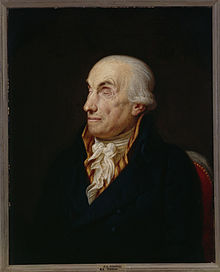École militaire (Colmar)
| École militaire de Colmar | |
|---|---|

|
|
| The former school building of the École Militaire on Rue Chauffour, Colmar | |
| founding | 1773 |
| closure | 1792 |
| place | Colmar |
| Department | Haut-Rhin |
| Country | France |
| Coordinates | 48 ° 4 ′ 30 ″ N , 7 ° 21 ′ 20 ″ E |
| management | Gottlieb Konrad Pfeffel |
The Ecole de Colmar militaire ( German , military school in Colmar ' ) in Alsace was an existing 1773-1792 Kriegsschule in which according to the ideals of human friendship ( Philanthropie was taught). The history of this school is closely linked to the educational work of the writer , military scientist and reform educator Gottlieb Konrad Pfeffel (1736–1809).
The former school building, today's Maison Pfeffel on Rue Chauffour in Colmar, is run by the French Ministry of Culture as a monument historique ('historical monument').
history
In 1773 Gottlieb Konrad Pfeffel founded the school in his native Colmar for the education of mostly noble boys from Protestant families. The establishment took place with the permission of the French King Louis XV. (1710-1774). Other military schools in France at the time accepted only Catholics .
Although conceived as a military training center, from 1782 even with the title Académie militaire (German: ' Militärakademie '), Pfeffel oriented itself on the principles of the Enlightenment and philanthropism , with the educational maxims of philanthropy and reason . Inspired by the work of the pedagogue Johann Bernhard Basedow (1724–1790) at his school in Dessau , the Philanthropinum , founded a year later , Pfeffel based his school on the Dessau model. Occasionally the military academy was also referred to as " philanthropist ".
Pfeffel's goal was not primarily to train officers, but to educate students to become morally educated citizens. He therefore reduced military teaching content to formalities such as order and discipline as well as the wearing of uniform and weapons. Pfeffel wrote to his supporter, the silk ribbon manufacturer Jakob Sarasin (1742–1802):
"Our institute is neither a school for scholars, soldiers nor businessmen, but a plant garden for all non-common classes ."
Nevertheless, numerous important military figures from the late 18th and early 19th centuries emerged from Pfeffel's Institute.
The school closed in 1792 as a result of the effects of the French Revolution , with which Pfeffel initially sympathized. Despite his republican sentiments, Pfeffel was threatened by the Jacobins of Colmar and had to close the school when he could no longer guarantee the safety of the predominantly aristocratic students.
Known teachers
- Johann Friedrich Butenschoen (1764–1842), German educator, journalist and one of the fathers of the Palatinate Church Union
- Franz Christian Lerse (1749–1800), German psychologist, philosopher, educator and writer
- Johann Friedrich Lucé (1751–1807), German theologian, later president and pastor of the Evangelical Consistorial Church in Soultzbach-les-Bains
- Michael Friedrich Wild (1747–1832), German geodesist and naturalist
Known students
- Rudolf Emanuel Effinger (1771–1847), Swiss politician, officer and agronomist
- Philipp Emanuel von Fellenberg (1771–1844), Swiss educator and agronomist
- Hans Christoph Ernst von Gagern (1766–1852), German statesman and political writer
- Ludwig Friedrich von Gemmingen (1765–1816), French captain
- Carl von Isenburg-Birstein (1766–1820), Prince of Isenburg and Büdingen
- Carl Gotthard von Liphart (1778-1853), Livonian land marshal and guard rider
- Carl Friedrich Rudolf May (1768–1846), Swiss politician
- Johann Heinrich Rothpletz (1766–1833), Swiss politician
- Friedrich Wilhelm zu Solms-Braunfels (1770–1814), Prussian major general
- Karl Friedrich Zimmermann (1765–1823), Swiss politician
literature
- Rebekka Horlacher: All letters to Johann Heinrich Pestalozzi. Volume 1, Walter de Gruyter, Berlin 2009, ISBN 978-3-11-021562-5 .
- Wilhelm Kühlmann (Ed.): Killy Literature Lexicon . Volume 9, 2nd edition, Walter de Gruyter, Berlin 2010, ISBN 978-3-11-022044-5 , pp. 187-188.
- Ernst Martin : Pfeffel, Gottlieb Konrad . In: Allgemeine Deutsche Biographie (ADB). Volume 25, Duncker & Humblot, Leipzig 1887, pp. 614-618.
- Walter E. Schäfer: Pfeffel, Gottlieb Konrad. In: New German Biography (NDB). Volume 20, Duncker & Humblot, Berlin 2001, ISBN 3-428-00201-6 , p. 307 f. ( Digitized version ).
- Friedrich Schultz: Gottlieb Conrad Pfeffel and the military school in Colmar. Decker, Colmar 1907.
- Chrétien-Hubert Pfeffel: L'école militaire de Colmar - pendant les années 1776–1779; notice tirée des mémoires manuscrits. Casino Litteraire, Mulhouse 1859.
- Gottlieb Konrad Pfeffel: Principes Du Droit Naturel - À L'Usage de l'École militaire & académique de Colmar. Neukirch, Colmar 1781.
Web links
- Maison Pfeffel in the Base Mérimée of the French Ministry of Culture (French).
- The Colmar Military Academy on the Colmar tourisme website , accessed on 19 April 2015.
Individual evidence
- ↑ Dominique Toursel-Harster, Jean-Pierre Beck, Guy Bronner: Dictionnaire des monuments historiques d'Alsace. La Nuée Bleu, Strasbourg 1995, ISBN 2-7165-0250-1 .
- ↑ a b Kühlmann, p. 187.
- ↑ a b Horlacher, p. 81.
- ↑ Swiss Teachers' Association (ed.): Swiss Pedagogical Journal. Volume 23, Zurich 1913, p. 290.
- ↑ Schäfer, p. 307
